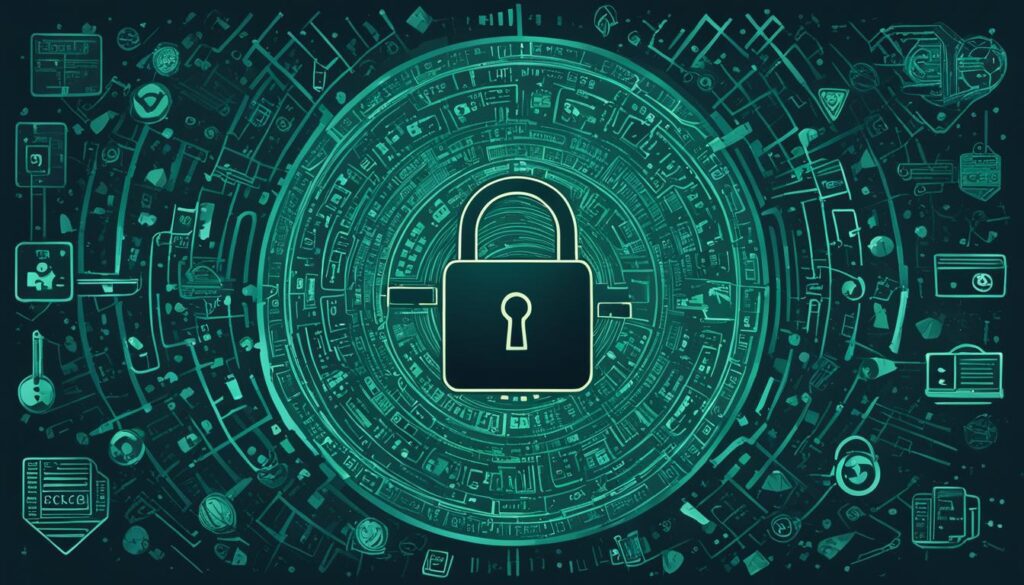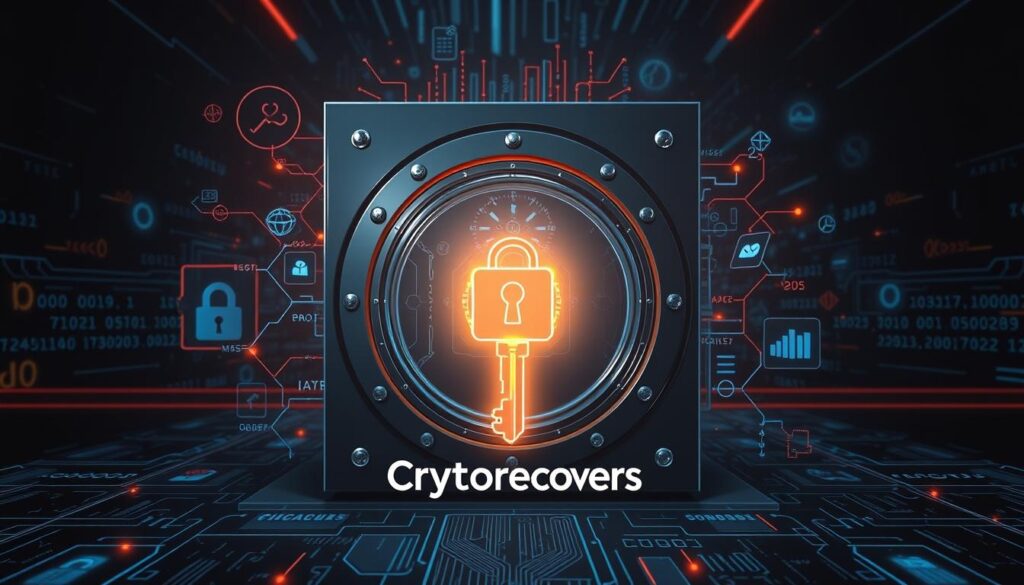A private key plays a crucial role in the world of cryptography and cryptocurrency. It is an alphanumeric code, typically consisting of hundreds of digits, that is used to authorize transactions and prove ownership of a blockchain asset.
Private keys are an integral part of the cryptocurrency ecosystem, providing users with protection against theft and unauthorized access to their funds. They represent the ultimate control and ownership of digital assets.
A cryptocurrency wallet consists of a set of public addresses and private keys. While public addresses are used to receive funds, private keys are necessary for authorizing transactions and ensuring the security of crypto assets.
Private keys can be generated by digital wallets and stored securely using different methods such as paper wallets or hardware wallets. The choice of storage method depends on individual preferences and risk tolerance.
It is of utmost importance to store private keys in a secure location to prevent unauthorized access to cryptocurrency assets. Losing control or access to a private key means losing access to the corresponding cryptocurrency asset.
Key Takeaways:
- A private key is an alphanumeric code used in cryptography and cryptocurrency.
- It is used to authorize transactions and prove ownership of a blockchain asset.
- Private keys are an integral part of cryptocurrency and protect users from theft.
- They can be generated by digital wallets and securely stored using various methods.
- Storing private keys securely is crucial to prevent unauthorized access to crypto assets.
How Private Keys Work
In the world of cryptocurrency, private keys play a crucial role in controlling digital assets and securing financial transactions. Understanding how private keys work is essential for anyone involved in crypto.
Private keys are used to authorize transactions and provide access to deposited cryptocurrencies. They are typically long alphanumeric codes that serve as a unique identifier for each user. These keys are expressed as strings of characters and must be kept confidential to prevent unauthorized access to the associated crypto assets.
One important characteristic of private keys is their ability to derive public addresses through a process called hashing. While it is possible to generate a public address from a private key, reversing the process to deduce the private key from the public address is practically impossible. This property ensures the security of public addresses and allows users to receive funds without revealing their private keys.
In addition to transaction authorization, private keys are also used in cryptographic operations. They enable the decryption of data and the creation of digital signatures, which verify the integrity and authenticity of transactions. Public keys, which are created from private keys using an encryption algorithm, are necessary for secure communication and ownership verification in cryptocurrencies.
Receiving addresses, which are derived from public keys, enable users to receive funds from other individuals or entities. When someone wants to send cryptocurrency to a particular user, they need to know the receiving address associated with that user’s public key.
Private Key Working Process
- A private key is generated for a cryptocurrency user.
- The private key is used to derive the public address, which can be freely shared with others. The public address allows others to send cryptocurrency to the user’s account.
- To authorize transactions, the private key is used to create a digital signature. The digital signature ensures the validity and integrity of the transaction.
- The transaction, along with the digital signature, is broadcasted to the network for verification.
- Once the transaction is verified, it is added to a block in the blockchain, and the user’s account balance is updated accordingly.
To ensure the security of private keys, it is essential to store them in secure locations. Wallets, either in software or hardware form, provide a means to keep private keys safe. Noncustodial wallets allow users to have control over their private keys, while custodial wallets store the keys on behalf of the users.
| Software Wallets | Hardware Wallets |
|---|---|
| ✓ Can be easily installed on computers and smartphones | ✓ Provide enhanced security through offline storage |
| ✓ Convenient for regular usage and easy access | ✓ Protect against malware and hacking attempts |
| ✓ Suitable for small to medium-sized cryptocurrency holdings | ✓ Preferred for long-term and large cryptocurrency holdings |
| Note: It is crucial to choose reputable wallets from trusted sources and regularly update software wallets to protect against vulnerabilities. | |
It is important to emphasize that private keys should never be shared with anyone. Giving someone your private key grants them full control over your cryptocurrency holdings.
By understanding how private keys function and taking the necessary precautions to safeguard them, individuals can enjoy the benefits of cryptocurrency while maintaining the security of their digital assets.

Private Keys and Digital Wallets
When it comes to managing private keys in the world of cryptocurrencies, digital wallets play a crucial role. These wallets automatically generate and securely store private keys, which are essential for authorizing transactions and ensuring the integrity of your crypto assets.
When you initiate a transaction using a digital wallet, the wallet software utilizes your private key to create a unique digital signature. This signature not only authorizes the transaction but also ensures that it cannot be tampered with or altered during the process.
Now, let’s explore some of the different methods and options for storing private keys securely:
- Paper Wallets: Private keys can be stored on paper by writing or typing them. Although this method may sound old-fashioned, it provides an offline and secure way to backup and store your keys.
- QR Code Generation: Some individuals opt for software that generates QR codes for their private keys. Scanning these QR codes with a smartphone makes it convenient to access your private keys when needed.

Hardware Wallets: If you prioritize maximum security, hardware wallets are an excellent choice. These physical devices store your private keys offline, ensuring that they remain protected from online threats.
Furthermore, you have the option to choose between custodial and noncustodial wallets. Custodial wallets store your private keys on your behalf, while noncustodial wallets give you direct control and responsibility for your keys.
When it comes to storage methods, there are two primary options:
- Cold Storage: Cold storage involves keeping your private keys offline and disconnected from the internet. This method provides an extra layer of security against potential hacking attempts.
- Hot Storage: In contrast, hot storage allows your private keys to remain connected to the internet for easier access and convenience.
The choice between cold and hot storage depends on your risk tolerance and technological abilities. Cold storage is often preferred by those who prioritize maximum security, while hot storage is suitable for users who require quick and frequent access to their crypto assets.
The Importance of Choosing the Right Wallet
Choosing the right digital wallet that fits your needs is crucial. It should not only provide a user-friendly interface but also ensure the highest level of security for your private keys and crypto assets.
By selecting a wallet that offers robust security measures, such as encryption and multi-factor authentication, you can significantly reduce the risk of unauthorized access to your private keys and funds.
Remember, keeping your private keys safe and secure is paramount in the world of cryptocurrencies. Consider your risk tolerance, storage options, and ease of use when selecting a digital wallet that offers enhanced protection for your private keys.
| Wallet Type | Pros | Cons |
|---|---|---|
| Custodial Wallets | – Convenient and easy to use – May offer additional services and support | – You relinquish control of your private keys – Security relies on the wallet provider |
| Noncustodial Wallets | – You have full control of your private keys – Offers enhanced security | – Requires responsible key management – Less user-friendly for beginners |
| Hot Storage | – Quick and easy access to funds – Convenient for frequent transactions | – Higher risk of potential hacks or theft – Requires robust security measures |
| Cold Storage | – Maximum security against online threats – Protects private keys offline | – Less convenient for frequent transactions – Requires extra precautions for key backup and retrieval |
Conclusion
Private keys are essential for ensuring the security and protection of cryptocurrency assets. They play a critical role in authorizing transactions and verifying ownership of digital funds. Safeguarding private keys is paramount to prevent the risk of theft or loss.
One of the most secure methods for storing private keys is through noncustodial cold storage solutions. By keeping keys offline and disconnected from accessible devices, the risk of unauthorized access is significantly reduced. Cryptocurrency investors and users should prioritize the security of their private keys to safeguard their digital assets.
It is crucial to store private keys in a secure location and regularly update them to minimize the vulnerability to potential threats. Choosing the right type of digital wallet and implementing proper key management practices is also essential. By taking precautions and employing noncustodial cold storage, individuals can create an additional layer of protection for their private keys and enhance their overall cryptocurrency security.
FAQ
What are private keys?
Private keys are alphanumeric codes used in cryptography and cryptocurrency. They are large codes with hundreds of digits and are used to authorize transactions and prove ownership of blockchain assets.
How do private keys work?
Private keys are used in asymmetric cryptography to decrypt data and create digital signatures. They are generated by digital wallets and can be securely stored using methods like paper wallets or hardware wallets. Public addresses and receiving addresses are derived from private keys through an encryption algorithm.
How are private keys related to digital wallets?
A digital wallet consists of a set of public addresses and private keys. When a transaction is initiated, the wallet software uses the private key to create a digital signature, authorizing the transaction. Different types of wallets exist, such as noncustodial wallets that allow users to store their own keys and custodial wallets that store keys on behalf of users.
How should private keys be stored?
It is important to store private keys securely to prevent unauthorized access to crypto assets. Options for storage include paper wallets, where the key is written or typed on paper, and hardware wallets that keep the keys offline. Noncustodial cold storage is considered one of the best ways to securely store private keys.
Why is protecting private keys important?
Private keys are essential for cryptocurrency security and digital asset protection. If private keys are stolen or lost, access to the corresponding cryptocurrency assets is lost as well. Safeguarding private keys is crucial to prevent theft or loss of crypto funds.
What are the risks of not properly securing private keys?
Not securing private keys can lead to unauthorized access to crypto assets and potential theft. Losing control or access to a private key means losing access to the corresponding cryptocurrency asset. It is important to take precautions and choose secure key management practices.
What is noncustodial cold storage?
Noncustodial cold storage is a method of securely storing private keys by removing them from accessible devices and connected wallets. This reduces the risk of unauthorized access to the keys and provides an extra layer of security for crypto assets.
How can I prioritize the protection of my private keys?
Cryptocurrency investors and users should prioritize the protection of their private keys. This can be done by storing them in a secure location, regularly updating them, and choosing the right wallet type that fits their needs and ensures the security of their private keys.
How important are private keys in cryptocurrency transactions?
Private keys are crucial for authorizing transactions and verifying ownership of crypto assets. They are used to create digital signatures that ensure the integrity and authenticity of transactions. Without private keys, transactions cannot be authorized or changed.
What is the role of private keys in cryptocurrency security?
Private keys play a vital role in cryptocurrency security by protecting ownership interests. They are used to decrypt data, generate digital signatures, and authorize transactions. Taking precautions to protect private keys is necessary in the evolving landscape of cryptocurrency and digital assets.










